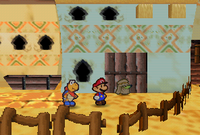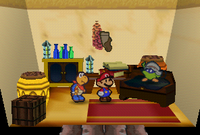Moustafa
Template:Character-infobox Moustafa (known as Sheek when disguised) is a green Nomadimouse who inhabits Dry Dry Outpost, which he has a great deal of control over, being the leader of a secret group of honorable thieves that dwell within it. He is a key character in the storyline of Chapter 2 in Paper Mario, where Mario must solve a riddle in order to meet him and receive the Pulse Stone to go to Dry Dry Ruins. In order to find Moustafa and obtain the Pulse Stone, Mario must purchase a Dried Shroom for 2 coins and then a Dusty Hammer for 2 coins from the Dry Dry Outpost item shop, and then re-enter the house which was previously blocked by Sheek. This method of obtaining the whereabouts of Moustafa may be found in-game by giving Sheek a Lemon, which may be found at the Dry Dry Desert Oasis.
History
Paper Mario
Upon arriving at the Dry Dry Outpost in Chapter 2, Mario learns that he must speak with Moustafa in order to reach the Dry Dry Ruins and rescue the Star Spirit that is imprisoned there. In order to gain an audience, however, he must first exchange items for information from an informant known as Sheek. If Mario gives Sheek his favorite thing, a Lemon obtained from the oasis in the desert, Sheek will instruct him to purchase a Dried Shroom and a Dusty Hammer, in that order, from the outpost shop, as this is a secret combination known only to Moustafa and his affiliates. It should be noted that obtaining this hint from Sheek first is not necessary for the secret code at the shop to work.
Purchasing the two items in the designated order leads the shopkeeper to tell Mario that Moustafa resides at the highest point of Dry Dry Outpost, and that Mario will need to keep climbing higher and higher in order to meet with him. Returning to the spot where Mario first met Sheek and continuing up through the buildings beyond it eventually leads the plumber to Moustafa's chamber, where he discovers that the leader of the thieves and the informant are one and the same, and that Moustafa resorts to using a disguise when out and about in the outpost. After detailing his status and a protector of Dry Dry Ruins, Moustafa yields to Mario the Pulse Stone, which helps lead him to the location of the ruins as well as raise them from the desert sands.
If Mario visits Moustafa after defeating Tutankoopa in the Dry Dry Ruins, he will tell Moustafa of what transpired there. Shocked at the revelation that minions of Bowser were in the Dry Dry Ruins, Moustafa will gratefully thank Mario for having gotten rid of Bowser's influence in the ruins, saying he will be eternally grateful to Mario. He also writes Mario a letter later in the game.
Moustafa, as well as several other Nomadimice, also appear in the parade that takes place after Paper Mario is beaten; during the parade, Moustafa and his companions stop to talk with Rowf and Rhuff before continuing onward.
An unnamed Toad in Toad Town, located near the port, will reveal that, having become lost in Dry Dry Desert, he was saved by Moustafa, who brought him to Dry Dry Outpost. It was there that Moustafa revealed to the Toad a large secret, though what this secret was is unrevealed. Additionally, the Nomadimouse seems to have met Moustafa, as the latter had sent him a letter; where the Nomadimouse met Moustafa is unrevealed, indeed, the Nomadimouse only had vague memories of meeting Moustafa at one time.
Paper Mario: The Thousand-Year Door
In Paper Mario: The Thousand-Year Door, Moustafa is mentioned in Lumpy's diaries, where he says he received assistance from Moustafa during his search of oil in Dry Dry Desert. Again, Moustafa asked "if you're a nice guy then give me something nice". Despite Lumpy giving nothing, Moustafa still took Lumpy to the location where there was oil.
Tattle
- This is Sheek. You'd think the guy could shake the dust from his clothes! If I didn't know he was an information trader, I'd say we should steer clear of him. Still, he's our best soure for gossip... As adventurers, we have to deal with all kinds!
- Da Da Da Duuum! Sheek reveals his true self! ...I guess that means he's the boss everyone talks about. Oh... I was expecting Moustafa to look a lot cooler.
Names in other languages
| Language | Name | Meaning |
|---|---|---|
| Japanese | ロレンチュ Rorenchu |
A pun on Lawrence (of Arabia) and "chu" the sound of a mouse squeaking. |
| Chinese | 劳伦斯鼠 Láolúnsī Shǔ |
Mouse Lawrence |
| German | Maustafa |
Moustafa |
| Spanish | Mustafá |
Moustafa |
Trivia
- It is not required to give "Sheek" a lemon in order to learn where Moustafa is. Buying a Dried Shroom followed by a Dusty Hammer will always result in the shop keeper telling where Moustafa is, regardless of whether Sheek has told Mario about the code or not. If Moustafa is found this way, he will comment upon meeting Mario about how surprised he is that Mario found him without anybody telling him how to, remarking that he "must be very lucky."
- The name of Moustafa's alter-ego, "Sheek", is reminiscent of Princess Zelda's alter-ego Sheik from The Legend of Zelda: Ocarina of Time. Both characters are royals who don an alter-ego as a disguise. In addition, Goombario seems to recite the classic Zelda melody ("Da Da Da Duuum!" meaning the player has obtained a treasure in the series) if he uses Tattle on the recently-revealed Moustafa. Moustafa's alter-ego may also be derived from the word "Sikh", a follower of the religion Sikhism, or the Arab title "Sheikh", meaning "elder".
- The requirement to meeting Moustafa (not as Sheek) by buying a Dried Shroom and Dusty Hammer is similar to the sequel's requirement to meeting Don Pianta, another Dried Shroom and a Dizzy Dial.
- His name is a pun on the common Muslim given name Mustafa (a name which in Arabic means "the Chosen One") combined with the word mouse (which is the real-world creature Moustafa's species is based on).
- His original Japanese name "Lawrence" is possibly a pun on the 1962 historical epic film Lawrence of Arabia, based on the life of British military officer T. E. Lawrence's experiences in the Arabian Peninsula during World War I.
| Little Mousers | |
|---|---|
| Characters | Little Mouser (character) • Mousimilian • Moustafa • Ms. Mowz • Nomadimouse (character) • Pierre |
| Species | Little Mouser • Little Skull Mouser |

